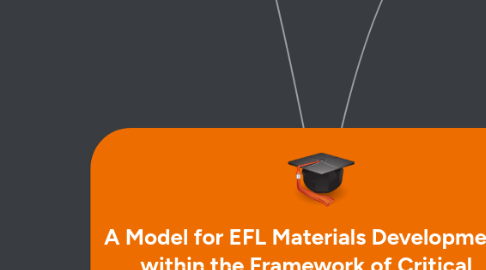
1. Factors
1.1. Program factors
1.1.1. Principle 1. Communication to realise about the world and how to change it Materials: skills + social structures. "Read the world while read the world" (related with the real situations worked in classes)
1.1.2. Principle 2. Learner has to be skillful in the language and have social skills and understand the world and reflect on how to change it. Relate skills with social realities make them valid not all learners have the same needs ( skills and information) they have to establish them. Cultural values, traditions and beliefs are taken from both TL and L1 cultures.
1.2. Content factors
1.2.1. Content source - the problematic reality in learners´life.
1.2.1.1. Principle 3: The discussion needs to provide resources for language learning.
1.2.1.2. Principle 4: The materials should be derived from the learner’s perspective.
1.2.1.3. Principle 4: The interest of the learner refers to their concern.
1.2.1.4. Principle 5: ELT materials can increase the learner’s intellectually
1.2.1.5. Principle 5: The materials should lead an integral relationship.
1.3. Pedagogical factors
1.3.1. Principle 6: The way of teaching is via engaging students in the cycle of reflection and action by embracing dialogical problem posing practices.
1.3.1.1. The mission of education is to help people fulfill their human vocation by involving in the cycle of reflection and action.
1.3.1.2. Human vocation is taking action to change the world for improvement of life conditions.
1.3.1.3. Requires students to participate in dialogical problem posing practices.
1.3.1.3.1. Relate the issue or problem to their own lives “personalization of the problem”
1.3.1.3.2. Discussion on the socioeconomic, political and/or cultural reasons of the problem.
1.3.1.4. Discussion for creation not discussion of an idea.
1.3.1.4.1. Students combine their experiences with the topic to verbalize what they think about it.
1.3.2. Principle 7: ELT materials base their content on source culture
1.3.2.1. With the spread of English around the world, there is no need for students to work on just the Anglo-American culture.
1.3.2.2. Focusing on local culture contributes to learners to reflect on the positive and negative features of their own culture.
1.3.2.3. Makes them critically aware and respectful of their own culture and prevent the development of a sense of inferiority.
1.4. Teacher factors
1.4.1. Principle 8: Teacher as a co-learner and coordinator.
1.4.2. Class works as a learning community.
1.4.3. Teacher as a problem-poser. (Asking questions that can stimulate students to reflect)
1.4.4. Teacher´s knowledge and skills are contributing “the learning community”.
1.4.5. Principle 9: Teachers should be aware of the socioeconomic and political issues engaged in teaching English.
1.4.6. Principle 9: Teachers should know about the implications of the internationalization of English.
1.5. Learner factors
1.5.1. Principle 10: Learner as a decision-maker and subject of the act. ( As a creative agent)
1.5.2. Principle 11: Learners should develop critical consciousness and language mastery.
